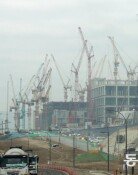Gov¡¯t promotes rural home construction
Gov¡¯t promotes rural home construction
Posted November. 01, 2000 13:53,
The plan to boost the regional construction industry that the government announced Tuesday is intended to inject vitality into regional construction firms, which are largely considered as two major businesses, along with distribution business.
As part of such efforts, the government plans to offer drastic tax incentives for purchasing houses in rural areas, as well as developing massive new towns similar to new towns around Seoul. Currently, one of the problems facing the Korean economy is a broad gap between the Seoul metropolitan area and all other areas. The non-metropolitan areas experience economic difficulties, and they trigger political and social problems.
Development of three regional new towns:
Chonan New Town, which will be built on a site of 3.16 million pyong near Chonan Station along the Seoul-Pusan High-speed Railway, is expected to be pursued from next year through private investment. Chonan City and Korea Land Development Corp. will invest 1.2 trillion won to create the building site and sell it to private construction companies to build 23,000 housing units.
Taejon will invest 1.8 trillion won to build 24,000 houses on 1.32 million pyong as a public housing development project, while Mokpo plans to invest 1.4 trillion won to construct 26,000 homes in an area on 2.76 million pyong where the provincial capital building will be located. Also, Pusan, Taegu and other major cities in the Youngnam area will study ways of developing new towns.
Reduction in housing-related taxes and fees:
For the purchase of new homes in rural areas other than the metropolitan area, the acquisition tax, registration tax and transfer income tax will be waived temporarily by the end of next year. The incentives are designed to boost housing construction in rural areas.
Construction of houses for lease will also be pursued in Pusan and Taegu, where the home ownership ratio is relatively low. To supply building sites for homes for lease, the government is going to lease the land it or state organizations own on a long-term basis.
Effect of boosting regional economy:
The government expects that such a boosting measure would result in building 120,000 homes in non-metropolitan areas with 6.4 trillion won of construction investment and create about 200,000 jobs over the next five years. Reduction in the purchasing price of a home will create new demand for new homes and build a firm basis of business for regional construction companies, according to government planners.
However, some are doubtful whether the tax incentives will create demand for new houses at a time when the economy shows signs of recession and the home ownership ratio exceeds 90%. In addition, the construction of three new towns is limited to those areas. So it has yet to be seen whether such a plan will be effective to inject vitality into nearly 30,000 regional construction firms.
Kwon Soon-Hwal ysshin@donga.com







